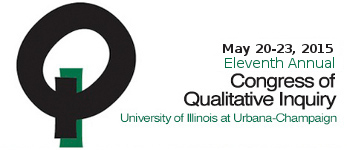 Session Inactivity
Session InactivityYour session has timed out. Click "Login" to login again or "Dismiss" to view the current page. If you dismiss you may cut and paste any work you were working on but any clicks on links or buttons may expire your session. |
 Session Inactivity
Session InactivityYour session is about to expire. You have less then 5 minutes remaining. If you are still working click the link below to refresh your session. |

Eleventh International Congress of Qualitative Inquiry May 20-23, 2015 University of Illinois at Urbana-Champaign CONSTRUCTING A NEW CRITICAL QUALITATIVE INQUIRY We shall not cease from exploration/ And the end of all our exploring/ Will be to arrive where we started/ And know the place for the first time (T. S. Elliot, No 4 of Four Quar- tets, 1942). Keynotes: The Power of Stories and the Potential of Theorizing for Social Justice Studies Kathy Charmaz, Sonoma State University Qualitative researchers have long demonstrated the power of stories. We have excelled at telling stories about the lives of individuals, including our own. We have applied earlier theories with success but the potential of fresh theorizing has yet to be real- ized. Storytelling and theorizing in qualitative research may seem to represent two distinct strands of qualitative inquiry. Our stories document individuals’ troubles and triumphs yet we can build on these stories to create theoretical analyses of them. Theorizing, particularly some forms of grounded theorizing, generates concepts but these concepts remain separate from people’s lives as well as from the theorists who created them. The social justice implications of both storytelling and theorizing often remain implicit. I call for bringing storytelling and theorizing together to offer new ways of understanding and addressing social justice issues. Constructivist grounded theory offers one way of integrating storytelling and theorizing to advance social jus- tice inquiry, which I show here. Moving Forward, Pushing Back Indigenous Methodologies in the Academy Margaret Kovach, University of Saskatchewan Cultural paradigms influence perspectives on knowledge and knowledge creation. This is an innocuous statement, not likely contested in academic sites. Yet the oft- held unexamined conception that research methodologies are only viable if conducted through a standardized process, built upon particular assumptions about knowledge, is a persistent backstory. Indigenous methodologies that are grounded in a counter cul- tural paradigm bring this backstory sharply into focus. Indigenous methodologies not only ask that this backstory be critically examined but propose a categorically different approach. In the past several years there has been an increasing interest in Indige- nous inquiry as a newly introduced methodology. However, it would be incorrect to underestimate the difficulty of proposing Indigenous methodologies in the contested cultural space of the academic landscape. In this talk, I will point to the politics and pragmatics of considering Indigenous inquiry in academic research. I propose that the next step in moving forward with Indigenous methodologies remains intricately linked to pushing back against a normative backstory of academic orthodoxy. The Eleventh International Congress of Qualitative Inquiry will take place at the University of Illinois, Urbana-Champaign from May 20-23, 2015. The theme of the 2015 Congress is “Constructing A New Critical Qualitative Inquiry.” The International Con- gress of Qualitative Inquiry (ICQI) will be starting its second decade in 2015. The first decade of the Congress capped a century and more of efforts by qualitative researchers to understand and transform our worlds through critical interpretive inquiry. The second decade charts a promising future. The Eleventh Congress will be built around the changes that are occurring in the field of qualitative inquiry (QI) (and ICQI) since the Congress was launched as an alternative site for collaboration and discourse. It is time to take stock, time to go back to the future, time to ask if it is time to begin constructing a new critical qualitative inquiry, a time to undo the past, time to re-think taken-for granted paradigms, frameworks, epistemologies, methodologies, ethics and the politics of inquiry. The 2015 Congress will offer delegates an opportunity to assess the major changes that have taken place over the last decade, and the last century. What might ICQI and QI look like at its 20th anniversary? What should the mandate be for the next decade? What have we learned? Where do we go next? Accordingly, delegates are invited to submit proposals for panels and sessions focused on the events surrounding the next decade of critical qualitative inquiry. The 2015 Congress will offer scholars the opportunity to explore a decade of change, while foregrounding qualitative inquiry as a shared, global endeavor. Panels, workshops and sessions will take up the politics of research. Delegates will be able to form coalitions, to engage in debate on how qualitative research can be used to advance the causes of social justice, while addressing racial, ethnic, gender and environmental disparities in education, welfare and healthcare. As in previous congresses, sessions will take up such topics as: the politics of evidence, right and left pole epistemologies, the meanings and uses of data, new models of science, new analytics of analysis and representation, the ethics of inquiry, public policy discourse, tenure, publishing, advocacy, partisanship, decolonizing inquiry. Contributors are invited to experiment with traditional and new methodologies, with new presentational formats (ethnodrama, performance, poetry, autoethnography, fiction). Such work will offer guide- lines and exemplars concerning advocacy, inquiry and social justice concerns. On May 20 there will be pre-conference special interest group events and on May 21, morning and afternoon professional workshops. The Congress will consist of keynote, ple- nary, spotlight, featured, regular, and poster sessions. There will be an opening reception and barbeque as well as a closing old fashioned Midwest cookout. We invite your submission of paper, poster and session proposals. Submissions will be accepted online beginning on August 15 until December 1, 2014. Conference and workshop registration will also begin August 15, 2014. To learn more about the 11th International Congress and how to participate, please visit our website: icqi.org |
|
©2024 All Academic, Inc. | Privacy Policy |
